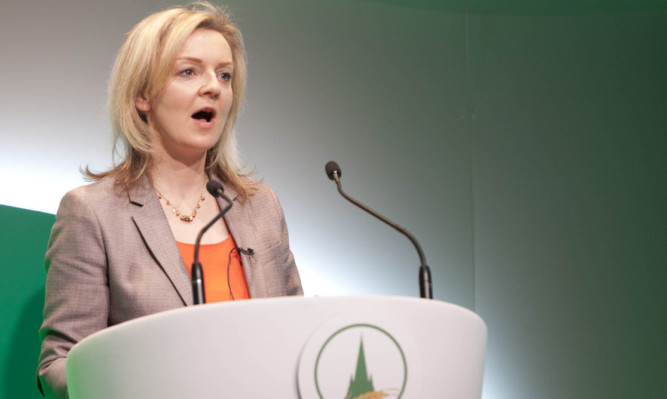Within an hour of the Oxford Farming Conference opening, it was clear there was an expanse of open water between the views of Defra Secretary Liz Truss and those of Scotland’s Cabinet Secretary Richard Lochhead.
The contested issue was the importance to farming of the UK’s continued EU membership.
Mrs Truss may have replaced Owen Paterson as Defra Secretary since his appearance at last year’s Oxford conference, but it was clear that the Whitehall speechwriters remain the same.
Her speech was strong on the importance of the global markets and the contribution farming could make to the UK economy.
“Farming is no sunset industry; it is a high-tech powerhouse at the heart of our long-term economic plan, vital to our country’s food security,” Mrs Truss asserted.
She did mention challenging times, but suggested the answers would come from the markets and from seizing opportunities.
She raised the possibility of a dairy futures market as a means of combating volatility.
However, in a 20-minute speech the words ‘Common Agricultural Policy’ did not pass her lips once, and it needed repeated prodding from conference chairman Richard Whitlock to draw any sort of comment as to how farming would be supported if the UK was to leave the EU.
Mrs Truss repeatedly said such a position was hypothetical, and the first approach before any 2017 referendum would be to negotiate within the EU for a simpler, more outward-looking CAP able to compete with the US and Asia in the global market.
“We want less bureaucracy and less interference, and I am confident that we can get change.
“The new CAP is very complex,” she said, adding that she had already spoken to new EU Farm Commissioner Phil Hogan about making greening regulations simpler.
Nonetheless, she managed to avoid the question of future farm policy.
It would appear there is as yet no alternative UK support scheme ready to place before referendum voters for their consideration.
Mrs Truss may have tried to keep the future of the CAP off the agenda, but Richard Lochhead more than made up for it by mentioning it many times.
Indeed, he launched straight into a defence of an EU-led farm policy, pausing only to remind his 450-strong audience that during his seven-year tenure he had dealt with five Defra secretaries and three EU Farm Commissioners.
The implication was that he had experience on his side.
“For many farmers in Scotland, opting out of farm support would mean opting out of farming. Support is vital,” he said.
“Westminster’s in-out referendum on the EU is a £20bn gamble with the future of Scottish and British farming,” he said describing the CAP as “our protective shield”.
The £20bn of support at risk was a calculation made over a six-year period.
“The stakes are high, especially for Scottish farmers and crofters for whom CAP support is a vital lifeline,” he said.
Admittedly the new CAP was complex, but some of that had been caused by the need to make the most of a poor budget deal.
The costs of implementing the new regime were also too high because of the required complexity.
“We must have change, but it has to come from within Europe,” Mr Lochhead added.
It should be pointed out that although Mrs Truss and Mr Lochhead were at the same conference they did not share the same platform. By the time Mr Lochhead spoke as part of a political panel, the Defra Secretary was on her way back to London.
She had, however, made strong points which had the audience nodding in agreement.
She was not to give up on the badger cull as part of a strategy to eradicate bovine TB from Great Britain by 2038. “We will not walk away from this one,” she said.
The cull had met its targets in Somerset but not in Gloucestershire, where the level of legal protest had hampered progress.
Mrs Truss did turn coy when asked whether the cull would be rolled out to other areas ahead of the general election.
The timetable had yet to be agreed.
Speaking in general terms, she said: “My role as Defra Secretary is to make things as simple as possible and stand up to anti-science rhetoric.”
Asked at a quick press briefing before her departure if she would stick to that line if it conflicted with the messages coming out of 10 Downing Street, she said only that she would always make decisions based on science.
Oxford Farming Conference regulars noted wryly that her predecessor Owen Paterson had made similar comments last year not long before his dismissal.
